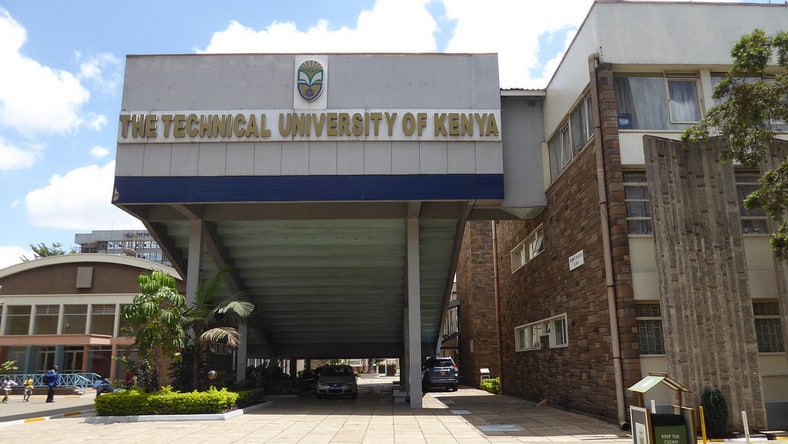Public universities in Kenya are facing an escalating financial crisis, with some institutions unable to pay full staff salaries for over a decade.
Amid rising operational costs, underfunding, and confusion surrounding the new student funding model, the sustainability of higher learning institutions is under serious threat.
At the centre of the crisis is the Technical University of Kenya (TUK), which has now openly declared it is struggling to keep operations going.
Appearing before the National Assembly’s Public Investment Committee on Education and Governance, Vice Chancellor Benedict Mutua revealed that TUK has failed to pay gross salaries to its staff since 2013.
Statutory deductions have not been remitted for years.
"From 2013, under the former vice chancellor, the staff have not been paid their gross salaries. The money we got could not support gross salaries as well as enable us to pay salaries," Mutua told MPs during the session chaired by Bumula MP Wanami Wamboka.
The university has been receiving Sh63.3 million per month, far below the required Sh272 million for staff salaries.
According to Mutua, the institution is bloated, with 1,820 employees for 14,200 students—a mismatch he believes cannot be sustained.
He recommended rationalisation of staff as a necessary step to remain operational.
The troubles at TUK mirror a broader financial collapse across Kenya’s public universities.
A string of reports by Auditor General Nancy Gathungu and Controller of Budget Margaret Nyakang’o paint a grim picture.
They show that institutions once seen as pillars of national development are now weighed down by growing debts, staff discontent, and uncertainty.
Moi University, for instance, has been on a downward spiral.
In recent months, it has initiated a retrenchment programme similar to TUK’s.
The university has struggled with industrial unrest, including staff strikes and delayed payments, forcing it to close for three months.
According to Nyakang’o’s latest report for the 2023–24 financial year, public universities and national polytechnics are struggling with a combined debt of Sh67.81 billion.
The largest debtors include the University of Nairobi (Sh12.22 billion), Kenyatta University (Sh12.38 billion), and Jomo Kenyatta University of Agriculture and Technology (Sh9.13 billion).
These institutions owe money to statutory bodies, contractors, and pension schemes.
The report notes that pending bills cover a wide range of obligations, including pension arrears, payments to suppliers, contractors, and unremitted statutory deductions such as NSSF and KRA.
The University of Nairobi, once the flagship of higher education in Kenya, now finds itself grappling with crippling financial obligations.
The effects of this debt are being felt across learning and research programmes, which depend on adequate funding to function effectively.
Moi University’s Sh7.83 billion debt led to the government pledging a bailout of Sh2.9 billion.
National Assembly Education Committee chair Julius Melly confirmed the intervention, saying, "Some Sh300 million will go towards scholarships this October, in addition to Sh217 million disbursed in August."
He added that further funding would be provided for tuition and student capitation.
Other universities in crisis include Egerton University (Sh7.69 billion), Masinde Muliro University of Science and Technology (Sh1.25 billion), Kisii University (Sh1.04 billion), and Maasai Mara University (Sh805.09 million).
Smaller universities such as Meru University of Science and Technology (Sh426.69 million), Kibabii University (Sh455.31 million), and Laikipia University (Sh283.60 million) are also facing high debts.
In total, dozens of universities are buried under massive financial obligations.
Some of the lowest debt figures include Karatina University (Sh35.84 million), Turkana University College (Sh10.82 million), and Allupe University (Sh16.29 million).
While these amounts are relatively small, they still reflect the nationwide trend of budget shortfalls and poor financial health.
Despite the mounting pressure, some leaders remain optimistic. "We have given money (especially TUK), they will not collapse," said Education Committee chair Julius Melly, downplaying fears that institutions may shut down.
However, reports presented to Parliament suggest otherwise.
A 2022 report by the Parliamentary Committee on Education warned that many public universities are at risk of insolvency unless funding is increased significantly.
The report noted that systemic issues in the higher education sector have not been addressed and that reforms have been too slow to make an impact.
The funding model, introduced recently to streamline support for students, has been blamed for creating confusion in the way universities manage their resources.
Coupled with reduced government allocation, the model has left many institutions unable to plan effectively.
In a desperate bid to manage wage bills, universities have resorted to retrenchments.
Moi and TUK are among those that have already laid off staff or announced plans to do so.
These measures, however, have not addressed the root problem—insufficient and inconsistent funding.
The University of Kabianga (Sh466.52 million), South Eastern Kenya University (Sh320.39 million), Jaramogi Oginga Odinga University of Science and Technology (Sh215.62 million), and Co-operative University of Kenya (Sh86.26 million) are among other institutions fighting to stay open.
The retrenchment plans and inability to pay staff not only lower morale but also affect the quality of education.
Lecturers and non-teaching staff are key to running universities effectively, and delays in payment have led to industrial unrest, reduced productivity, and a loss of skilled personnel.
In the midst of these challenges, students also bear the brunt.
Learning is disrupted when universities close or when teaching staff go on strike.
Essential services like libraries, labs, and research centres suffer from budget cuts, reducing the quality of education and the global competitiveness of graduates.

